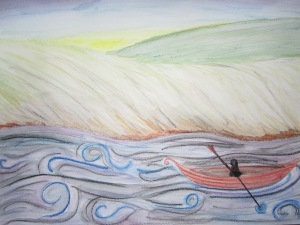The River Styx
The River Styx
There is a black river running beneath my skin. It travels to the underworld of my psyche, and like the river of myth that carried dead souls to Hades (and occasionally some living ones), this river in me carries dead thoughts (and occasionally some living ones).
There is life and warmth and sunshine and laughter on the surface, above the river.
We had a good day.
Of course Mommy wants to play.
I would love to go to the park with you.
I’m so happy for you, darling.
My life is beautiful, and my family is beautiful, and I love all of it.
Below the surface, the river tumbles over itself, tumultuous, dangerous. The dead thoughts can seem alive, beckoning, if I only pay the ferryman what he is due – a little of my self-worth.
What if they don’t like you?
Nobody wants to know who you are really.
Everyone will leave you, and you will deserve it because you drove them away with your mistakes.
Others problems are bigger than yours. What could you possibly have to feel sad about?
You are failing as a mother.
Happiness is a choice, and if you have not chosen it, you are the only one to blame.
You are wasting your life.
Nobody you care about is safe.
Come and take a ride with us. There’s always room for one more on the ferry to hell.
And it is hell, because when that river of death swells and bubbles, it gushes out of me and lashes out at others I care about. I blame my children. I hide from my husband. I beg people not to leave me. I avoid the waiting, pop-eyed gaze of Charon the ferryman by escaping into a drink or a book or the internet or laundry. I bide my time, fearful of being carried off like Perspehone into a world of sorrow and lonliness.
They say that Achilles was dipped in the River Styx at his birth, and it made him immortal (all except for that vexing heel where they held him). The antidote to its hateful waters lies not on the banks but inside the river itself.
Our culture puts so much value on being happy and the pursuit of such, that it has become unacceptably passé to feel or express sadness unless everything is obviously going to pieces (and even then, we are uncomfortable with other people’s sadness – we’d do anything to avoid it or fix it for them so neither of us has to feel it). We are meant to seem like we are making it, and we have carefully crafted all the masks we need, all perfectly coiffed and made-up.
The Mask of Happiness.
The Mask of Success.
The Mask of Wisdom.
The Mask of Perfection.
The Mask of Poise.
The Mask of Faith.
The Mask of Patience.
The Mask of Having an Opinion.
We make our masks to mimic qualities we admire, and lives we want to lead, but the real experience of them lies on the other side of the river.
Where do we turn when our masks become too heavy to hold? Surely we cannot go home naked? We have no choice but to face the river, but we can’t do it alone. Who will wait on the banks when a living, suffering being seeks immunity in the torrent of doubt and hate and fear that reside in the roiling waters? Who do we call forth to wait and watch while we battle our demons until it is time to pull us back up?
My masks that were so easy to pick up have, after so much time, become a burden to bear, and over the last month I have had to lay many of them down. It is terrifying to face my family and tell them the truth that I have spent so much time pretending to be happy that I have forgotten what real happiness feels like. I’ve forgotten how to enjoy living. I’ve forgotten how to enjoy my children’s laughter, how to feel the peace of nature, how to feel what I am feeling without the sludge of doubt and stress mucking it all up.
And now it is me and Styx.
I don’t have a lot of guardians to stand on the bank for me, but I might have enough. I threw away my swimsuit. Onward I go, to seek my real life, for better or worse.

